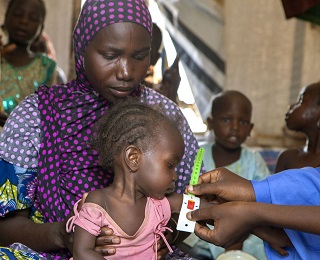An estimated quarter of a million children severely malnourished in Borno state, Nigeria - UNICEF
An estimated quarter of a million children in Borno state, North-East Nigeria, face severe malnourishment and risk death, UNICEF said on Jul 18, as the scale of the humanitarian crisis caused by the Boko Haram emergency continues to unfold.

A young girl is screened for malnutrition in the Dalori camp for internally displaced people in Borno State, Nigeria.
As more areas in the northeast become accessible to humanitarian assistance, the extent of the nutrition crisis affecting children is becoming even more apparent.
The UN children’s agency urges all partners to join the humanitarian response and donors to urgently provide resources.
Out of the 244,000 children suffering from severe acute malnutrition in Borno this year, an estimated 49,000 children – almost 1 in 5 – will die if they are not reached with treatment.
“Some 134 children on average will die every day from causes linked to acute malnutrition if the response is not scaled up quickly," said Manuel Fontaine, UNICEF Regional Director for Western and Central Africa, who just returned from a visit to Borno state. "We need all partners and donors to step forward to prevent any more children from dying. No one can take on a crisis of this scale alone."
While visiting newly accessible sites, previously under Boko Haram control, Fontaine witnessed destroyed towns accommodating displaced people, families with little access to adequate sanitation, water or food, and thousands of frail children in desperate need of help.
"There are 2 million people we are still not able to reach in Borno state, which means that the true scope of this crisis has yet to be revealed to the world,” Fontaine said. "There are organizations on the ground doing great work, but none of us are able to work at the scale and quality that we need. We must all scale up."
UNICEF is working with partners to screen and treat children for malnutrition and improve access to water and sanitation. UNICEF’s humanitarian response also includes providing medical care, immunization, education and psychological support to the children affected by the violence.
In early 2016, UNICEF appealed for $55.5 million to respond to the humanitarian crisis in north-east Nigeria, but has so far only received $23 million – 41 percent. As the children’s agency gains access to new areas with vast humanitarian needs in the coming weeks, it expects the appeal to increase significantly.
Source: United Nations Children's Fund
- 313 reads
Human Rights
Fostering a More Humane World: The 28th Eurasian Economic Summi

Conscience, Hope, and Action: Keys to Global Peace and Sustainability

Ringing FOWPAL’s Peace Bell for the World:Nobel Peace Prize Laureates’ Visions and Actions

Protecting the World’s Cultural Diversity for a Sustainable Future

Puppet Show I International Friendship Day 2020

